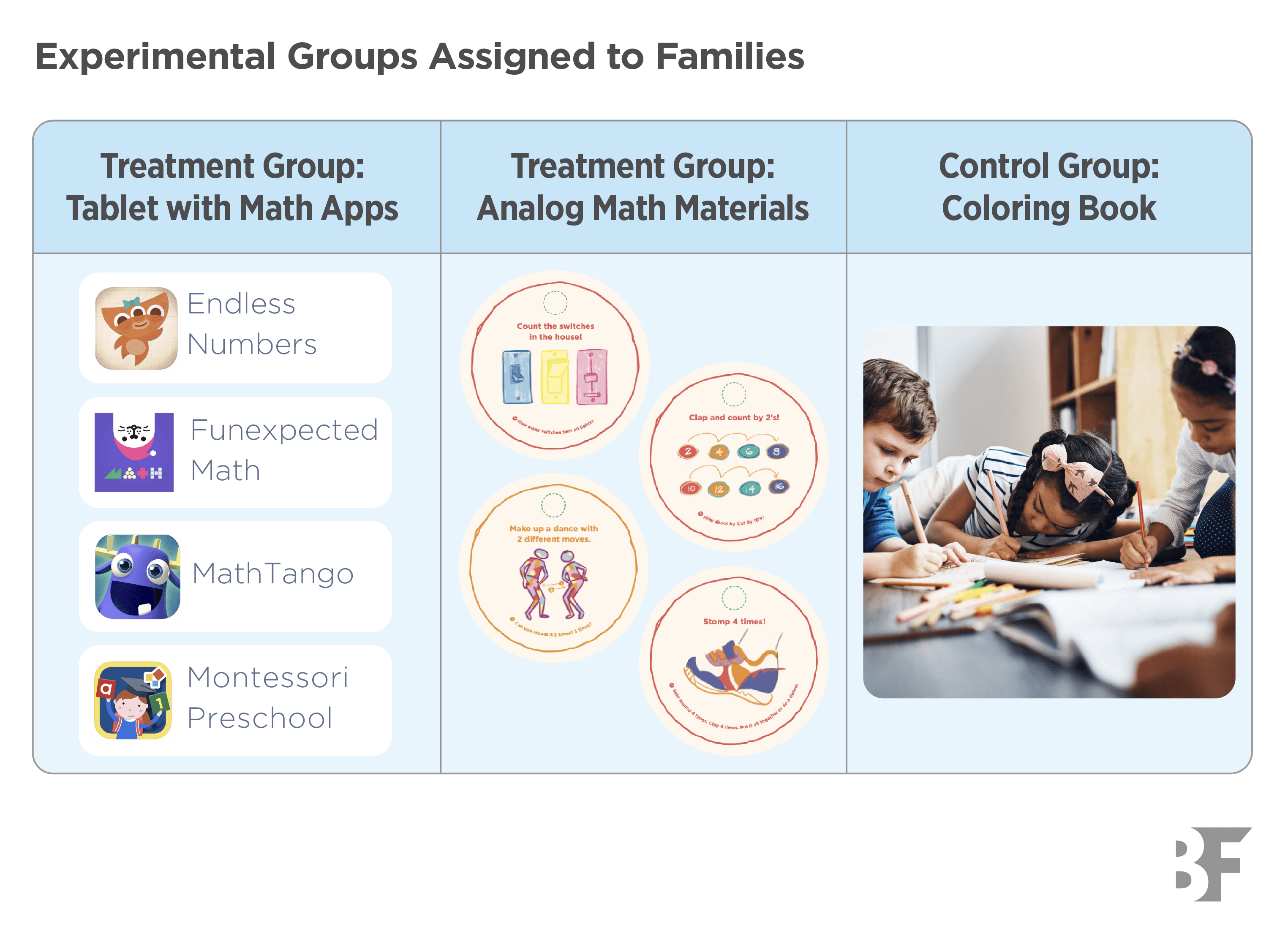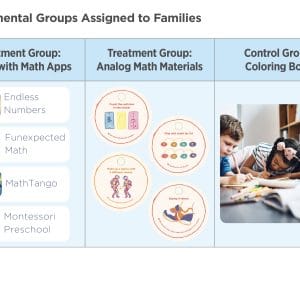Math skills developed in early childhood predict later academic achievement, yet socioeconomic gaps in these skills emerge even before children start formal schooling. A key contributor to these disparities is variation in how much and how effectively parents engage their children in learning activities at home. While much research focuses on classroom-based interventions, evidence on home-based strategies to improve early math skills remains limited. In this paper, the authors investigate whether providing families with high-quality math learning materials, either digital apps or traditional analog materials, can improve young children’s math skills and reduce achievement gaps by parental education.
The authors conduct a six-month randomized controlled trial called About TIME (About Technology in Math Engagement) with 459 families of preschoolers aged 3-5 from 35 Chicago preschools spanning the socioeconomic spectrum. They randomly assign families to one of three groups: a control group receiving a coloring book unrelated to math, a treatment group receiving a tablet preloaded with four high-quality math apps, or a treatment group receiving analog math materials designed to match the content of the apps.

The authors assess children’s math skills at baseline as well as after six months using a standardized measure of their ability to understand and work with numbers. They also collect detailed survey data on parental time investment, attitudes, and experiences with the materials, along with objective app usage data from the tablets.
The authors compare outcomes across the three experimental groups and find the following:
- Children whose parents did not hold a bachelor’s degree and were assigned to the math app group improved their math skills by 5 percentiles in the national distribution of math skills (0.17 standard deviations), compared to the control group. This gain closed approximately one-third of the initial 25-percentile-point gap between children of BA and non-BA parents. In contrast, the intervention had no detectable effect on children of college-educated parents.
- Analog materials showed no significant effects for any group.
- The benefits of About TIME were specific to parental education. When families were divided by household income (above or below the median) or by children’s baseline math scores, no significant treatment effects emerged. This suggests that parental education captures a distinct dimension of family advantage related to access to quality learning resources.
- Non-BA parents valued and used the apps more than BA parents. Among families in the math app group, 74% of non-BA parents reported that the About TIME apps taught math more effectively than their other materials, compared to just 40% of BA parents. Non-BA parents also used the apps about one additional day per week, and objective usage data showed they spent roughly 50% more time on the apps than BA parents. This suggests that the benefits of the About TIME apps differed by parental education because the counterfactual learning environments vary sharply across groups.
- Math apps substituted for analog materials, rather than increasing total learning time. Parents in the math app group reduced time spent on analog math activities by about 10 minutes per week while modestly increasing time with math apps, with no change in total math learning time. There was also a spillover effect: families receiving math apps reduced weekly reading time with their children by about 21 minutes.
- The findings replicate results from a previous study with disadvantaged families. When the About TIME sample was restricted to children from publicly subsidized preschools (matching the recruitment source of the authors’ earlier MPACT study), the math app intervention produced a 0.16 SD improvement—closely matching MPACT’s finding of 0.20 SD. This demonstrates the robustness and replicability of the intervention’s benefits for disadvantaged preschoolers.
These findings have important implications for addressing early childhood achievement gaps. The results suggest that unequal access to high-quality, easy-to-use math learning materials is a significant driver of skill gaps by parental education. Unlike advantaged families who already possess comparable resources at home, disadvantaged families lack access to such materials and therefore benefit substantially from receiving them. The replication of findings from the earlier MPACT study strengthens confidence that at-home technology can be a scalable tool for improving math outcomes among disadvantaged preschoolers.











